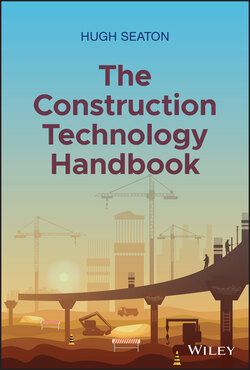Читать книгу The Construction Technology Handbook - Hugh Seaton - Страница 20
Construction's New Era
ОглавлениеSometimes we can lose sight of the amazing power of construction. Yes it's a huge industry, yes it employs a huge number of people. But so is retail, so is real estate. Construction isn't just big, it is foundational, and it matters that we continually improve.
Unlike any other sector of human activity, construction makes possible our most basic needs, and our highest aspirations. Construction tames nature, creating the safety and predictability that makes everything else possible. Construction also thrusts our buildings into the clouds, creating spectacles that inspire us to believe nothing is impossible.
Society needs construction, and in a world remade by the 2020 pandemic, we are going to need new things from construction, and construction is going to need new things from technology.
Construction is going to change, probably faster in the next five years than in the past fifty. Of course, it has been evolving and changing all along, but those changes have been slow and not evenly distributed across the industry. For example, the role of architects has changed from that of “master builder” to designer, leaving general contractors to take on risks that maybe they didn't originally want. The information gap that architects left has changed how RFIs1 happen, how change orders happen, and so on.
Similarly, the traditional design‐bid‐build, while alive and well for many projects, is under pressure around the world, as Design‐Build and Integrated Project Delivery approaches are explored. But most of these changes didn't reach to how the building is built. Prior to about 2010, the massive digital transformation that has swept through every industry from banking to farming barely touched construction.
In the last decade, though, things have started to go digital in the field. According to James Benham of JBKnowledge: “It's all driven by consumerization of technology. Workers who have iPhones and apps and can facetime their daughter three states away expect at least that level of technology on the jobsite. When they couldn't find it from tech firms, they started making their own.”
That's a part of the mindset shift we're talking about. The change in expectation, the change in sense of digital competence that allowed superintendents and tradesmen who were not necessarily technologists by training to feel like they were good enough to create their own solutions. They felt that way because they use digital technology all day long outside of construction, so it seemed obvious that they should use it on the job. But that consumerization mindset is just that, from the realm of the consumer.
To really make the difference we have seen in other industries, digital transformation requires that the mindset shift from that of construction professionals dabbling on their iPhones, to digital construction professionals working in software and other technologies from the ground up. We need to cultivate the skill of understanding what kind of problem we are trying to solve, and using the right tool, whether intuitive or digital or a combination, to solve the problem and put the work in place.
